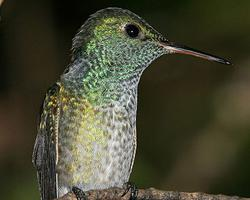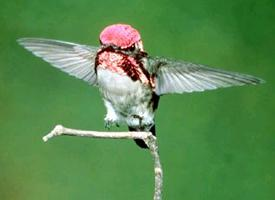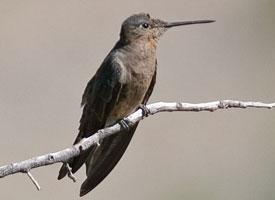
Greutăți și măsuri
| Înălțime la greabăn | de la 8 la 10 cm |
|---|
Starea de conservare
| Amenințat |
Descrierea animalului
The Versicoloured Emerald (Chrysuronia versicolor), a captivating species of hummingbird, is a marvel of nature, showcasing an array of shimmering colors and remarkable agility. This small bird, typically ranging in length from about 8.5 to 10 cm, is predominantly found in a wide stretch of Latin America, from Panama in Central America down through to northern Argentina and Uruguay in South America. Its habitat is quite diverse, spanning from lowlands and subtropical regions to moist montane forests, often up to elevations of 2000 meters, indicating its adaptability to various environmental conditions.One of the most striking features of the Versicoloured Emerald is its dazzling plumage. The male, in particular, displays a magnificent spectrum of colors. Its crown and nape glimmer with a golden green, transitioning to a vibrant blue on the throat and upper breast. The back and rump exhibit a rich golden hue, which contrasts beautifully with the deep greens of the wings and tail. Females, while slightly less vivid, also possess a beautiful green plumage that allows them to blend seamlessly into their leafy surroundings. Both sexes have a characteristic white postocular spot, adding to their distinct appearance.
The Versicoloured Emerald's diet is predominantly nectar-based, extracted from a variety of flowering plants. Its long, slender bill is perfectly adapted for accessing nectar deep within flowers, and its rapid wing beats – a hummingbird's hallmark – allow it to hover with precision as it feeds. This bird also consumes small insects and spiders, which provide essential proteins and other nutrients.
Breeding behaviors of the Versicoloured Emerald are fascinating, with males performing intricate aerial displays to attract females. These displays showcase their agility and the vibrant colors of their plumage. The female is solely responsible for nest construction, choosing a secure site where she crafts a small, cup-shaped nest using plant fibers, spider webs, and other materials, which is then camouflaged with lichens. She typically lays two white eggs, which she incubates for about 14 to 19 days. The hatchlings are altricial, meaning they are born blind and featherless, entirely dependent on their mother for warmth and food.
The Versicoloured Emerald plays a vital role in its ecosystem as a pollinator. As it moves from flower to flower in search of nectar, pollen adheres to its body, which is then transferred to other flowers, facilitating cross-pollination. This interaction highlights the importance of the Versicoloured Emerald in maintaining the health and diversity of its habitat.
Despite facing threats from habitat destruction and fragmentation, the Versicoloured Emerald has managed to maintain stable populations across its range, thanks in part to its adaptability to different environments, including areas modified by human activities. However, ongoing conservation efforts are crucial to ensure that this mesmerizing species continues to thrive for generations to come, serving as a vibrant testament to the richness of our planet's biodiversity.
Animale similare
Fotografii noi cu animale
Top 10 animale
- Diana monkey (Cercopithecus diana)
- Dolphin gull (Leucophaeus scoresbii)
- Galápagos tortoise (Geochelone nigra complex)
- Moustached guenon (Cercopithecus cephus)
- Japanese spider crab (Macrocheira kaempferi)
- Colossal squid (Mesonychoteuthis hamiltoni)
- Fox tapeworm (Echinococcus multilocularis)
- Stone loach (Barbatula barbatula)
- Japanese macaque (Macaca fuscata)
- Barbary macaque (Macaca sylvanus)

